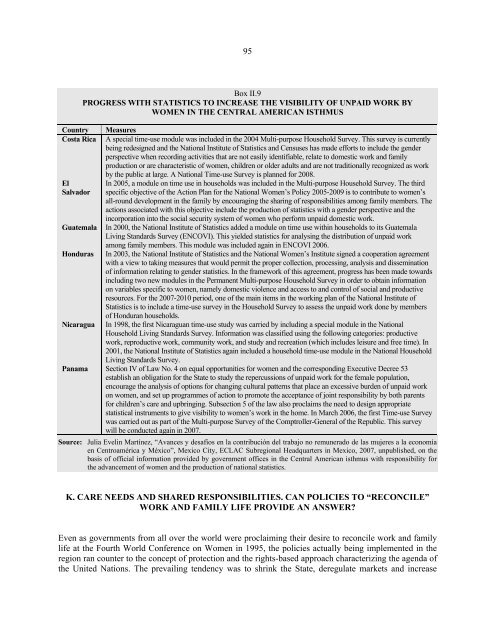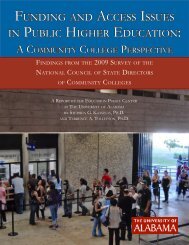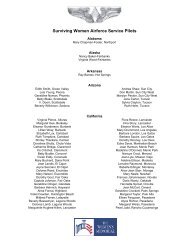Women in Latin America and the Caribbean - Cepal
Women in Latin America and the Caribbean - Cepal
Women in Latin America and the Caribbean - Cepal
You also want an ePaper? Increase the reach of your titles
YUMPU automatically turns print PDFs into web optimized ePapers that Google loves.
95<br />
Country<br />
Costa Rica<br />
El<br />
Salvador<br />
Guatemala<br />
Honduras<br />
Nicaragua<br />
Box II.9<br />
PROGRESS WITH STATISTICS TO INCREASE THE VISIBILITY OF UNPAID WORK BY<br />
WOMEN IN THE CENTRAL AMERICAN ISTHMUS<br />
Measures<br />
A special time-use module was <strong>in</strong>cluded <strong>in</strong> <strong>the</strong> 2004 Multi-purpose Household Survey. This survey is currently<br />
be<strong>in</strong>g redesigned <strong>and</strong> <strong>the</strong> National Institute of Statistics <strong>and</strong> Censuses has made efforts to <strong>in</strong>clude <strong>the</strong> gender<br />
perspective when record<strong>in</strong>g activities that are not easily identifiable, relate to domestic work <strong>and</strong> family<br />
production or are characteristic of women, children or older adults <strong>and</strong> are not traditionally recognized as work<br />
by <strong>the</strong> public at large. A National Time-use Survey is planned for 2008.<br />
In 2005, a module on time use <strong>in</strong> households was <strong>in</strong>cluded <strong>in</strong> <strong>the</strong> Multi-purpose Household Survey. The third<br />
specific objective of <strong>the</strong> Action Plan for <strong>the</strong> National <strong>Women</strong>’s Policy 2005-2009 is to contribute to women’s<br />
all-round development <strong>in</strong> <strong>the</strong> family by encourag<strong>in</strong>g <strong>the</strong> shar<strong>in</strong>g of responsibilities among family members. The<br />
actions associated with this objective <strong>in</strong>clude <strong>the</strong> production of statistics with a gender perspective <strong>and</strong> <strong>the</strong><br />
<strong>in</strong>corporation <strong>in</strong>to <strong>the</strong> social security system of women who perform unpaid domestic work.<br />
In 2000, <strong>the</strong> National Institute of Statistics added a module on time use with<strong>in</strong> households to its Guatemala<br />
Liv<strong>in</strong>g St<strong>and</strong>ards Survey (ENCOVI). This yielded statistics for analys<strong>in</strong>g <strong>the</strong> distribution of unpaid work<br />
among family members. This module was <strong>in</strong>cluded aga<strong>in</strong> <strong>in</strong> ENCOVI 2006.<br />
In 2003, <strong>the</strong> National Institute of Statistics <strong>and</strong> <strong>the</strong> National <strong>Women</strong>’s Institute signed a cooperation agreement<br />
with a view to tak<strong>in</strong>g measures that would permit <strong>the</strong> proper collection, process<strong>in</strong>g, analysis <strong>and</strong> dissem<strong>in</strong>ation<br />
of <strong>in</strong>formation relat<strong>in</strong>g to gender statistics. In <strong>the</strong> framework of this agreement, progress has been made towards<br />
<strong>in</strong>clud<strong>in</strong>g two new modules <strong>in</strong> <strong>the</strong> Permanent Multi-purpose Household Survey <strong>in</strong> order to obta<strong>in</strong> <strong>in</strong>formation<br />
on variables specific to women, namely domestic violence <strong>and</strong> access to <strong>and</strong> control of social <strong>and</strong> productive<br />
resources. For <strong>the</strong> 2007-2010 period, one of <strong>the</strong> ma<strong>in</strong> items <strong>in</strong> <strong>the</strong> work<strong>in</strong>g plan of <strong>the</strong> National Institute of<br />
Statistics is to <strong>in</strong>clude a time-use survey <strong>in</strong> <strong>the</strong> Household Survey to assess <strong>the</strong> unpaid work done by members<br />
of Honduran households.<br />
In 1998, <strong>the</strong> first Nicaraguan time-use study was carried by <strong>in</strong>clud<strong>in</strong>g a special module <strong>in</strong> <strong>the</strong> National<br />
Household Liv<strong>in</strong>g St<strong>and</strong>ards Survey. Information was classified us<strong>in</strong>g <strong>the</strong> follow<strong>in</strong>g categories: productive<br />
work, reproductive work, community work, <strong>and</strong> study <strong>and</strong> recreation (which <strong>in</strong>cludes leisure <strong>and</strong> free time). In<br />
2001, <strong>the</strong> National Institute of Statistics aga<strong>in</strong> <strong>in</strong>cluded a household time-use module <strong>in</strong> <strong>the</strong> National Household<br />
Liv<strong>in</strong>g St<strong>and</strong>ards Survey.<br />
Panama Section IV of Law No. 4 on equal opportunities for women <strong>and</strong> <strong>the</strong> correspond<strong>in</strong>g Executive Decree 53<br />
establish an obligation for <strong>the</strong> State to study <strong>the</strong> repercussions of unpaid work for <strong>the</strong> female population,<br />
encourage <strong>the</strong> analysis of options for chang<strong>in</strong>g cultural patterns that place an excessive burden of unpaid work<br />
on women, <strong>and</strong> set up programmes of action to promote <strong>the</strong> acceptance of jo<strong>in</strong>t responsibility by both parents<br />
for children’s care <strong>and</strong> upbr<strong>in</strong>g<strong>in</strong>g. Subsection 5 of <strong>the</strong> law also proclaims <strong>the</strong> need to design appropriate<br />
statistical <strong>in</strong>struments to give visibility to women’s work <strong>in</strong> <strong>the</strong> home. In March 2006, <strong>the</strong> first Time-use Survey<br />
was carried out as part of <strong>the</strong> Multi-purpose Survey of <strong>the</strong> Comptroller-General of <strong>the</strong> Republic. This survey<br />
will be conducted aga<strong>in</strong> <strong>in</strong> 2007.<br />
Source: Julia Evel<strong>in</strong> Martínez, “Avances y desafíos en la contribución del trabajo no remunerado de las mujeres a la economía<br />
en Centroamérica y México”, Mexico City, ECLAC Subregional Headquarters <strong>in</strong> Mexico, 2007, unpublished, on <strong>the</strong><br />
basis of official <strong>in</strong>formation provided by government offices <strong>in</strong> <strong>the</strong> Central <strong>America</strong>n isthmus with responsibility for<br />
<strong>the</strong> advancement of women <strong>and</strong> <strong>the</strong> production of national statistics.<br />
K. CARE NEEDS AND SHARED RESPONSIBILITIES. CAN POLICIES TO “RECONCILE”<br />
WORK AND FAMILY LIFE PROVIDE AN ANSWER<br />
Even as governments from all over <strong>the</strong> world were proclaim<strong>in</strong>g <strong>the</strong>ir desire to reconcile work <strong>and</strong> family<br />
life at <strong>the</strong> Fourth World Conference on <strong>Women</strong> <strong>in</strong> 1995, <strong>the</strong> policies actually be<strong>in</strong>g implemented <strong>in</strong> <strong>the</strong><br />
region ran counter to <strong>the</strong> concept of protection <strong>and</strong> <strong>the</strong> rights-based approach characteriz<strong>in</strong>g <strong>the</strong> agenda of<br />
<strong>the</strong> United Nations. The prevail<strong>in</strong>g tendency was to shr<strong>in</strong>k <strong>the</strong> State, deregulate markets <strong>and</strong> <strong>in</strong>crease











